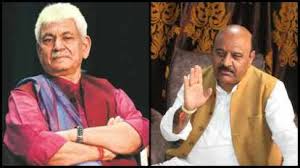Why J&K Deputy CM is turning up heat on L-G Sinha over ‘dual power centres’

Srinagar, July 8, 2025 – Political tensions in Jammu and Kashmir have escalated. Deputy Chief Minister Surinder Kumar Choudhary publicly accused Lieutenant Governor Manoj Sinha of undermining the elected government. He claimed the LG has created a “dual power centre” that blocks effective governance.
This accusation highlights the conflict in J&K’s governance since it lost statehood in 2019. After the downgrade, the region became a Union Territory. The elected government and the LG now share power in an uneasy arrangement. The National Conference and Congress lead the current coalition government. Their recent conflict exposes major flaws in this model.
Deputy CM Speaks Out
Deputy CM Choudhary expressed deep frustration. He said Raj Bhawan bypasses the elected leaders repeatedly. “We were elected to serve the people. Yet, important decisions happen without our consultation,” he said. These decisions include transfers, postings, and budget allocations.
Choudhary reacted strongly to the transfer of 24 senior IAS and JKAS officers. These moves happened without informing the Chief Minister’s Office. He said this showed a disregard for democracy. “Our mandate seems irrelevant,” he added.
Confusing Governance Model
Jammu and Kashmir now follows a governance style similar to Delhi’s. It shares power between an elected government and a centrally appointed LG. However, unlike Delhi, J&K lacks clear legal guidelines on how much power the LG holds.
Constitutional expert Dr. Feroze Ahmad explains, “The J&K Reorganisation Act does not clearly define the LG’s role versus the elected government.” This uncertainty causes power struggles, especially since the Centre and the local government belong to different political parties.
Though tensions existed for months, Choudhary’s recent comments are the most direct challenge yet. Chief Minister Omar Abdullah also expressed concern about the lack of coordination with Raj Bhawan.
LG Sinha’s Response
Lieutenant Governor Manoj Sinha denied any conflict. He said his office and the elected government work together for the people’s benefit. “We focus on development in every part of J&K,” he stated.
Despite this, documents show the LG’s office approved key bureaucratic transfers without Cabinet approval. This fact raises doubts about the LG’s claim that he respects the elected government’s authority.
Critics accuse the LG of centralizing control. They say he reduces elected leaders to mere figureheads.
Opposition Demands Statehood
The political tension revived calls for restoring J&K’s full statehood. National Conference leader Omar Abdullah said the current system is unworkable. “Democracy fails when elected leaders are overshadowed by an unelected official,” he said.
Congress spokesperson Ravinder Sharma warned that this interference could spark protests. “If this continues, we will escalate our fight to Delhi,” Sharma declared.
Even smaller parties like the People’s Democratic Front and Apni Party criticized the LG’s growing control. They worry about democracy slipping away.
Governance Suffers
The conflict affects more than politics—it impacts daily governance. Several welfare projects, including rural development and education reforms, are delayed. Officials blame the power tussle for these setbacks.
A senior bureaucrat shared anonymously, “We receive conflicting orders from ministers and the LG’s advisors. It creates confusion on the ground.”
In a sensitive region like J&K, such confusion harms both security and development efforts.
What Lies Ahead?
With Assembly elections expected soon, this power struggle will influence J&K’s future. The National Conference plans a major statehood rally in Srinagar. They want to reclaim democratic control.
Legal experts suggest the issue might reach the Supreme Court. They reference the Delhi government’s case as a precedent. However, J&K’s unique status after Article 370 complicates this path.
Conclusion: Democracy at a Crossroads
Deputy CM Choudhary’s comments reveal a deeper crisis. The “dual power centres” show that democracy in J&K is under threat. The elected government struggles to function when an unelected authority holds key powers.
Unless the Centre clarifies roles and respects local mandates, political paralysis may continue. This fragile power-sharing model suits no one and risks further instability in the region.






